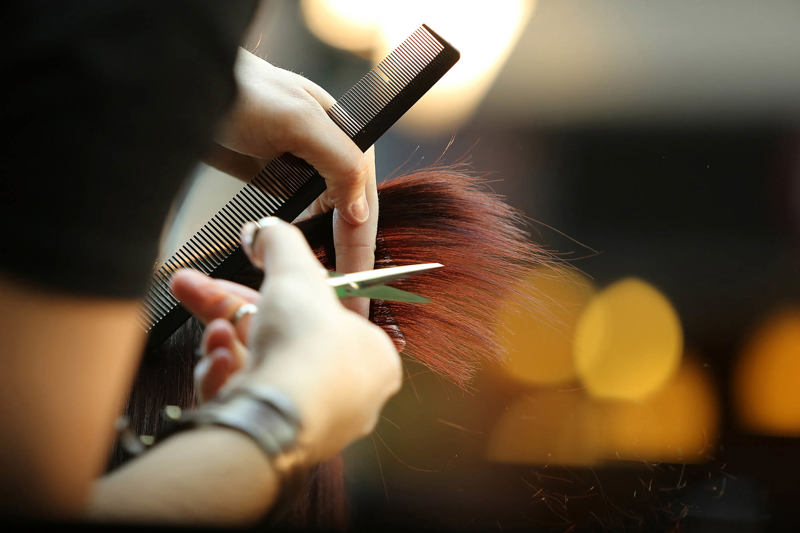Waste from hair and beauty salons
What you must do
Duty of Care for Waste
 You must understand your waste responsibilities and comply with the Duty of Care for Waste. This includes:
You must understand your waste responsibilities and comply with the Duty of Care for Waste. This includes:
- Use waste transfer notes (WTN) when waste leaves your site, or a “season ticket” WTN from your waste company.
- Store waste safely and securely to prevent windblown litter
- Present glass, metal, plastic, paper, and card (including cardboard) for separate collection
- Segregate food waste for separate collection if required.
Find all the requirements in our guideline:
Duty of Care: Your waste responsibilities
Separate hazardous/special waste
Hazardous waste includes:
- Fluorescent light bulbs
- Some empty chemical containers
- Liquid wastes that can’t be disposed of to sewers (certain chemicals)
Read the safety data sheets that come with chemicals to see if unused or waste containers must be treated as hazardous/special waste. Liquid waste cannot be disposed of in landfill sites and certain chemicals and dyes used in the hairdressing and beauty sector could be harmful if disposed of down the sink and into public sewers.
Use funnels and drip trays to capture any liquid and to recover the product for reuse. Clean up spills immediately.
Use dry clean–up methods for spills. Don’t hose down work areas or floors and create larger amounts of contaminated water.
You should have a Trade Effluent Consent from your water/sewerage provider. This will give information on what you can and cannot put into the sewers.
Read our guidance on hazardous/special waste and managing liquid wastes
Clinical type waste
If you use syringes or needles (e.g. for Botox) you must segregate them in an appropriate container labelled as sharps. Clinical waste must be segregated and dealt with according to:
NHS: Safe Management of Healthcare Waste
Good practice
Set up a recycling station in your workplace and make sure you can separate the main types of waste you produce. Make sure staff use it and encourage clients to use it too.
This will allow you to reuse or recycle key materials. Once you can see what types of waste you produce, and what makes up the most of your waste, you can take steps to reduce waste.
You can look at ways to avoid producing waste in the first place.
Reduce waste
Use products carefully – consider dispensing products in measured amounts using pump dispensers or measures. This will reduce the volume of waste produced, and over time this will amount to savings on waste costs.
Using less shampoo, dyes, nail and other products can be done without reducing the quality of the service. Mix only what you need, and always completely empty product bottles before discarding. It will reduce waste, and the amount of products ending up in the sewers.
Try and use products with a longer shelf-life.
You could reduce paper use, by emailing or texting clients’ appointments rather than giving paper slips.
Paper towels are often used in salons to prevent hair and hand dryers from blowing dust and chemicals around. These could be replaced with paper dispensers that will deliver a single sheet at a time. This prevents numerous towels being pulled out at once.
Reuse
Look for products that you can buy in bulk and use to refill dispensers. This prevents throwing out containers, bottles and cans.
Use pump dispensers instead of aerosols – this means the dispensers can be refilled instead of throwing away cans.
Cut hair can be reused to make wigs and you will be contributing to a good cause.
- Wigs for kids: donate hair
- Little Princess Trust: donate hair
- Cancer Research UK: Hair donation and wigs
Hair can also be taken for composting, as can paper towels. Speak to your waste collection provider to find out the options in your area.
Recycle
All waste collectors, when collecting waste paper, metal, plastic or glass must ensure that those wastes are collected separately. To ensure this takes place efficiently and effectively you should take all measures possible to segregate your wastes. If you produce any large quantity of any other material you should speak to your waste service provider, or you can find places to recycle it using the waste directories.
You can include separate recycling for any material that you produce, such as batteries, electrical equipment or foil wraps. The waste directory will allow you find your nearest recycling site for that material.
Further information
Any business that wants to reduce its waste should contact:
The Virtual Salon
Ecohair and beauty have developed their Virtual Salon. You can log on and enter the virtual salon to learn about sustainable hair care in a fun and engaging way.
Get a Sustainable Certificate for you and your salon!
Working with industry leaders and the All Party Political Group (includes Habia, Hair Council, NHF, VTCT) Eco Hair and Beauty have created TWO certifications.
1. Sustainable Stylist Certificate
2. Sustainable Salon Certificate
Complete our virtual salon training to get the Stylist certificate. Once most of the staff have completed this, the salon manager can complete the super quick and easy Salon Certificate form.
Find out more ands sign up for your free access to the virtual salon.
Ecohair and Beauty: Virtual Salon
SEE ALSO: Guidance for the Hair and Beauty sector
